Business Ethics Report: UK Car Industry, Stakeholders, and Theories
VerifiedAdded on 2020/01/23
|10
|2332
|57
Report
AI Summary
This report examines business ethics within the context of the car manufacturing industry in the United Kingdom. It begins with an introduction to business ethics, emphasizing the importance of moral principles and values for organizational success and adherence to laws and regulations. The report then proceeds to a stakeholder analysis, identifying both internal (employees, managers, investors) and external stakeholders (customers, competitors, government) and their influence on the business. The analysis highlights ethical issues faced by these stakeholders. Furthermore, the report explores normative theories, including utilitarianism, egoism, ethics of duty, ethics of rights, and virtue ethics, offering insights into ethical decision-making. Finally, the report concludes by summarizing the key findings and emphasizing the importance of ethical practices for achieving business success and maintaining a competitive advantage in the market. The report suggests a systematic approach to resolve ethical dilemmas faced by car manufacturing industries.
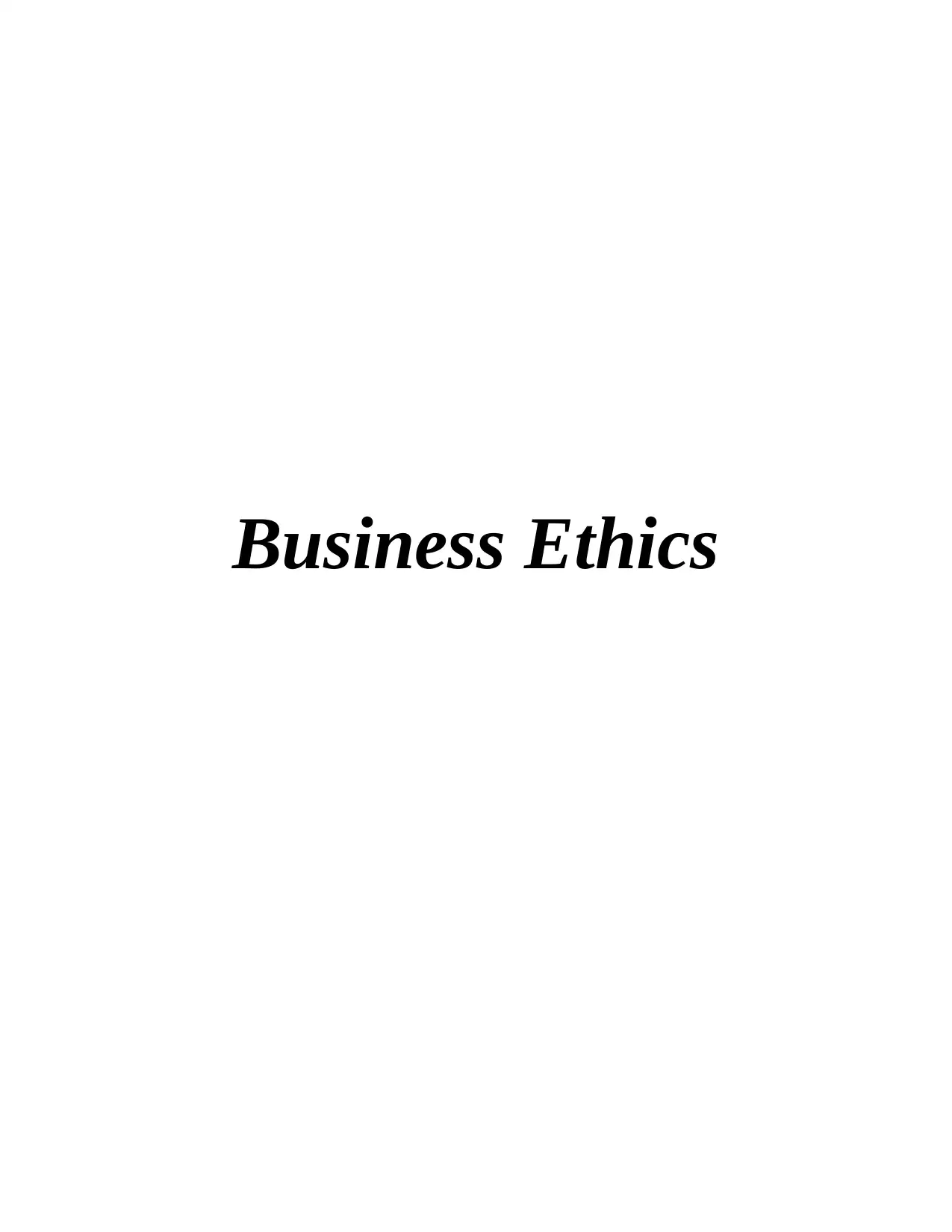
Business Ethics
Paraphrase This Document
Need a fresh take? Get an instant paraphrase of this document with our AI Paraphraser
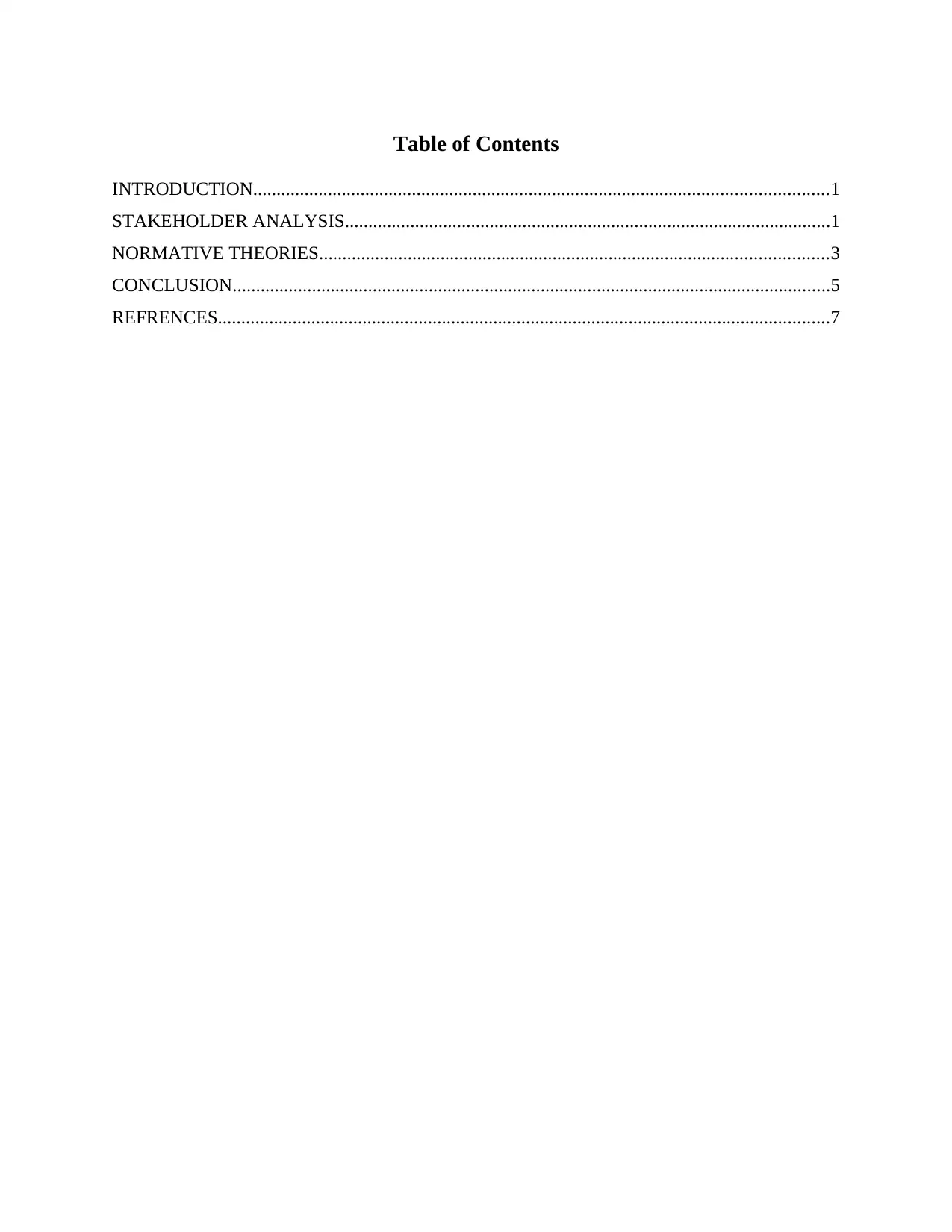
Table of Contents
INTRODUCTION...........................................................................................................................1
STAKEHOLDER ANALYSIS........................................................................................................1
NORMATIVE THEORIES.............................................................................................................3
CONCLUSION................................................................................................................................5
REFRENCES...................................................................................................................................7
INTRODUCTION...........................................................................................................................1
STAKEHOLDER ANALYSIS........................................................................................................1
NORMATIVE THEORIES.............................................................................................................3
CONCLUSION................................................................................................................................5
REFRENCES...................................................................................................................................7
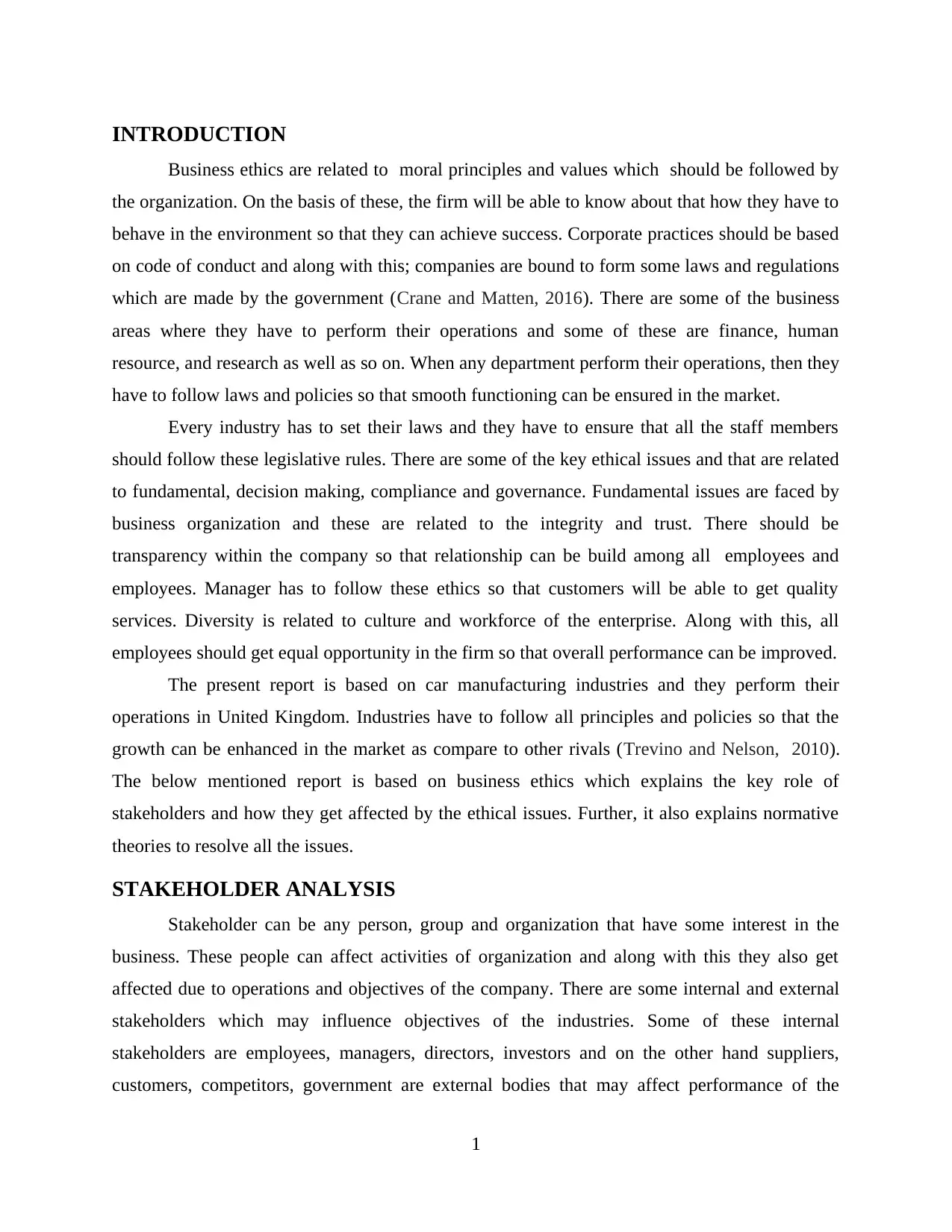
INTRODUCTION
Business ethics are related to moral principles and values which should be followed by
the organization. On the basis of these, the firm will be able to know about that how they have to
behave in the environment so that they can achieve success. Corporate practices should be based
on code of conduct and along with this; companies are bound to form some laws and regulations
which are made by the government (Crane and Matten, 2016). There are some of the business
areas where they have to perform their operations and some of these are finance, human
resource, and research as well as so on. When any department perform their operations, then they
have to follow laws and policies so that smooth functioning can be ensured in the market.
Every industry has to set their laws and they have to ensure that all the staff members
should follow these legislative rules. There are some of the key ethical issues and that are related
to fundamental, decision making, compliance and governance. Fundamental issues are faced by
business organization and these are related to the integrity and trust. There should be
transparency within the company so that relationship can be build among all employees and
employees. Manager has to follow these ethics so that customers will be able to get quality
services. Diversity is related to culture and workforce of the enterprise. Along with this, all
employees should get equal opportunity in the firm so that overall performance can be improved.
The present report is based on car manufacturing industries and they perform their
operations in United Kingdom. Industries have to follow all principles and policies so that the
growth can be enhanced in the market as compare to other rivals (Trevino and Nelson, 2010).
The below mentioned report is based on business ethics which explains the key role of
stakeholders and how they get affected by the ethical issues. Further, it also explains normative
theories to resolve all the issues.
STAKEHOLDER ANALYSIS
Stakeholder can be any person, group and organization that have some interest in the
business. These people can affect activities of organization and along with this they also get
affected due to operations and objectives of the company. There are some internal and external
stakeholders which may influence objectives of the industries. Some of these internal
stakeholders are employees, managers, directors, investors and on the other hand suppliers,
customers, competitors, government are external bodies that may affect performance of the
1
Business ethics are related to moral principles and values which should be followed by
the organization. On the basis of these, the firm will be able to know about that how they have to
behave in the environment so that they can achieve success. Corporate practices should be based
on code of conduct and along with this; companies are bound to form some laws and regulations
which are made by the government (Crane and Matten, 2016). There are some of the business
areas where they have to perform their operations and some of these are finance, human
resource, and research as well as so on. When any department perform their operations, then they
have to follow laws and policies so that smooth functioning can be ensured in the market.
Every industry has to set their laws and they have to ensure that all the staff members
should follow these legislative rules. There are some of the key ethical issues and that are related
to fundamental, decision making, compliance and governance. Fundamental issues are faced by
business organization and these are related to the integrity and trust. There should be
transparency within the company so that relationship can be build among all employees and
employees. Manager has to follow these ethics so that customers will be able to get quality
services. Diversity is related to culture and workforce of the enterprise. Along with this, all
employees should get equal opportunity in the firm so that overall performance can be improved.
The present report is based on car manufacturing industries and they perform their
operations in United Kingdom. Industries have to follow all principles and policies so that the
growth can be enhanced in the market as compare to other rivals (Trevino and Nelson, 2010).
The below mentioned report is based on business ethics which explains the key role of
stakeholders and how they get affected by the ethical issues. Further, it also explains normative
theories to resolve all the issues.
STAKEHOLDER ANALYSIS
Stakeholder can be any person, group and organization that have some interest in the
business. These people can affect activities of organization and along with this they also get
affected due to operations and objectives of the company. There are some internal and external
stakeholders which may influence objectives of the industries. Some of these internal
stakeholders are employees, managers, directors, investors and on the other hand suppliers,
customers, competitors, government are external bodies that may affect performance of the
1
⊘ This is a preview!⊘
Do you want full access?
Subscribe today to unlock all pages.

Trusted by 1+ million students worldwide
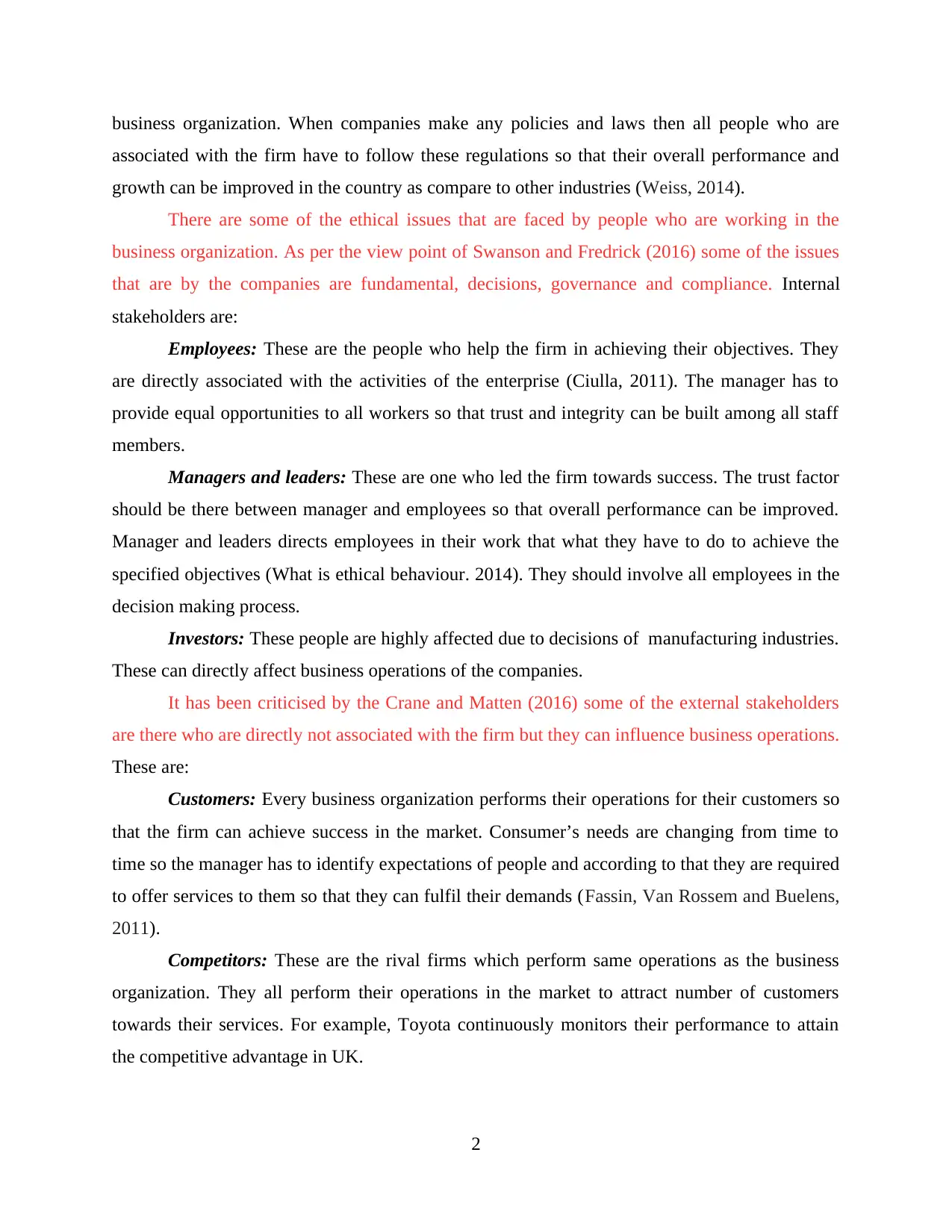
business organization. When companies make any policies and laws then all people who are
associated with the firm have to follow these regulations so that their overall performance and
growth can be improved in the country as compare to other industries (Weiss, 2014).
There are some of the ethical issues that are faced by people who are working in the
business organization. As per the view point of Swanson and Fredrick (2016) some of the issues
that are by the companies are fundamental, decisions, governance and compliance. Internal
stakeholders are:
Employees: These are the people who help the firm in achieving their objectives. They
are directly associated with the activities of the enterprise (Ciulla, 2011). The manager has to
provide equal opportunities to all workers so that trust and integrity can be built among all staff
members.
Managers and leaders: These are one who led the firm towards success. The trust factor
should be there between manager and employees so that overall performance can be improved.
Manager and leaders directs employees in their work that what they have to do to achieve the
specified objectives (What is ethical behaviour. 2014). They should involve all employees in the
decision making process.
Investors: These people are highly affected due to decisions of manufacturing industries.
These can directly affect business operations of the companies.
It has been criticised by the Crane and Matten (2016) some of the external stakeholders
are there who are directly not associated with the firm but they can influence business operations.
These are:
Customers: Every business organization performs their operations for their customers so
that the firm can achieve success in the market. Consumer’s needs are changing from time to
time so the manager has to identify expectations of people and according to that they are required
to offer services to them so that they can fulfil their demands (Fassin, Van Rossem and Buelens,
2011).
Competitors: These are the rival firms which perform same operations as the business
organization. They all perform their operations in the market to attract number of customers
towards their services. For example, Toyota continuously monitors their performance to attain
the competitive advantage in UK.
2
associated with the firm have to follow these regulations so that their overall performance and
growth can be improved in the country as compare to other industries (Weiss, 2014).
There are some of the ethical issues that are faced by people who are working in the
business organization. As per the view point of Swanson and Fredrick (2016) some of the issues
that are by the companies are fundamental, decisions, governance and compliance. Internal
stakeholders are:
Employees: These are the people who help the firm in achieving their objectives. They
are directly associated with the activities of the enterprise (Ciulla, 2011). The manager has to
provide equal opportunities to all workers so that trust and integrity can be built among all staff
members.
Managers and leaders: These are one who led the firm towards success. The trust factor
should be there between manager and employees so that overall performance can be improved.
Manager and leaders directs employees in their work that what they have to do to achieve the
specified objectives (What is ethical behaviour. 2014). They should involve all employees in the
decision making process.
Investors: These people are highly affected due to decisions of manufacturing industries.
These can directly affect business operations of the companies.
It has been criticised by the Crane and Matten (2016) some of the external stakeholders
are there who are directly not associated with the firm but they can influence business operations.
These are:
Customers: Every business organization performs their operations for their customers so
that the firm can achieve success in the market. Consumer’s needs are changing from time to
time so the manager has to identify expectations of people and according to that they are required
to offer services to them so that they can fulfil their demands (Fassin, Van Rossem and Buelens,
2011).
Competitors: These are the rival firms which perform same operations as the business
organization. They all perform their operations in the market to attract number of customers
towards their services. For example, Toyota continuously monitors their performance to attain
the competitive advantage in UK.
2
Paraphrase This Document
Need a fresh take? Get an instant paraphrase of this document with our AI Paraphraser
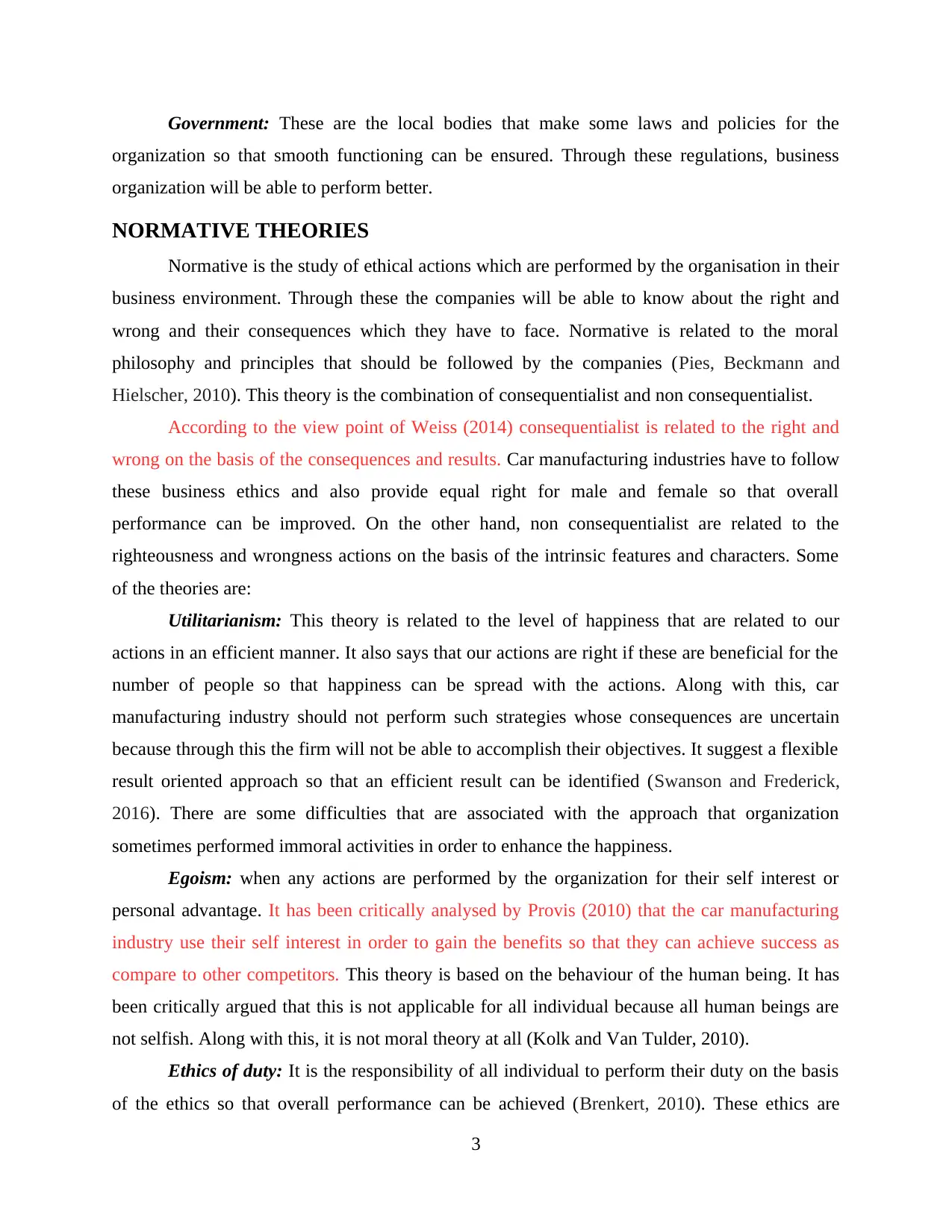
Government: These are the local bodies that make some laws and policies for the
organization so that smooth functioning can be ensured. Through these regulations, business
organization will be able to perform better.
NORMATIVE THEORIES
Normative is the study of ethical actions which are performed by the organisation in their
business environment. Through these the companies will be able to know about the right and
wrong and their consequences which they have to face. Normative is related to the moral
philosophy and principles that should be followed by the companies (Pies, Beckmann and
Hielscher, 2010). This theory is the combination of consequentialist and non consequentialist.
According to the view point of Weiss (2014) consequentialist is related to the right and
wrong on the basis of the consequences and results. Car manufacturing industries have to follow
these business ethics and also provide equal right for male and female so that overall
performance can be improved. On the other hand, non consequentialist are related to the
righteousness and wrongness actions on the basis of the intrinsic features and characters. Some
of the theories are:
Utilitarianism: This theory is related to the level of happiness that are related to our
actions in an efficient manner. It also says that our actions are right if these are beneficial for the
number of people so that happiness can be spread with the actions. Along with this, car
manufacturing industry should not perform such strategies whose consequences are uncertain
because through this the firm will not be able to accomplish their objectives. It suggest a flexible
result oriented approach so that an efficient result can be identified (Swanson and Frederick,
2016). There are some difficulties that are associated with the approach that organization
sometimes performed immoral activities in order to enhance the happiness.
Egoism: when any actions are performed by the organization for their self interest or
personal advantage. It has been critically analysed by Provis (2010) that the car manufacturing
industry use their self interest in order to gain the benefits so that they can achieve success as
compare to other competitors. This theory is based on the behaviour of the human being. It has
been critically argued that this is not applicable for all individual because all human beings are
not selfish. Along with this, it is not moral theory at all (Kolk and Van Tulder, 2010).
Ethics of duty: It is the responsibility of all individual to perform their duty on the basis
of the ethics so that overall performance can be achieved (Brenkert, 2010). These ethics are
3
organization so that smooth functioning can be ensured. Through these regulations, business
organization will be able to perform better.
NORMATIVE THEORIES
Normative is the study of ethical actions which are performed by the organisation in their
business environment. Through these the companies will be able to know about the right and
wrong and their consequences which they have to face. Normative is related to the moral
philosophy and principles that should be followed by the companies (Pies, Beckmann and
Hielscher, 2010). This theory is the combination of consequentialist and non consequentialist.
According to the view point of Weiss (2014) consequentialist is related to the right and
wrong on the basis of the consequences and results. Car manufacturing industries have to follow
these business ethics and also provide equal right for male and female so that overall
performance can be improved. On the other hand, non consequentialist are related to the
righteousness and wrongness actions on the basis of the intrinsic features and characters. Some
of the theories are:
Utilitarianism: This theory is related to the level of happiness that are related to our
actions in an efficient manner. It also says that our actions are right if these are beneficial for the
number of people so that happiness can be spread with the actions. Along with this, car
manufacturing industry should not perform such strategies whose consequences are uncertain
because through this the firm will not be able to accomplish their objectives. It suggest a flexible
result oriented approach so that an efficient result can be identified (Swanson and Frederick,
2016). There are some difficulties that are associated with the approach that organization
sometimes performed immoral activities in order to enhance the happiness.
Egoism: when any actions are performed by the organization for their self interest or
personal advantage. It has been critically analysed by Provis (2010) that the car manufacturing
industry use their self interest in order to gain the benefits so that they can achieve success as
compare to other competitors. This theory is based on the behaviour of the human being. It has
been critically argued that this is not applicable for all individual because all human beings are
not selfish. Along with this, it is not moral theory at all (Kolk and Van Tulder, 2010).
Ethics of duty: It is the responsibility of all individual to perform their duty on the basis
of the ethics so that overall performance can be achieved (Brenkert, 2010). These ethics are
3
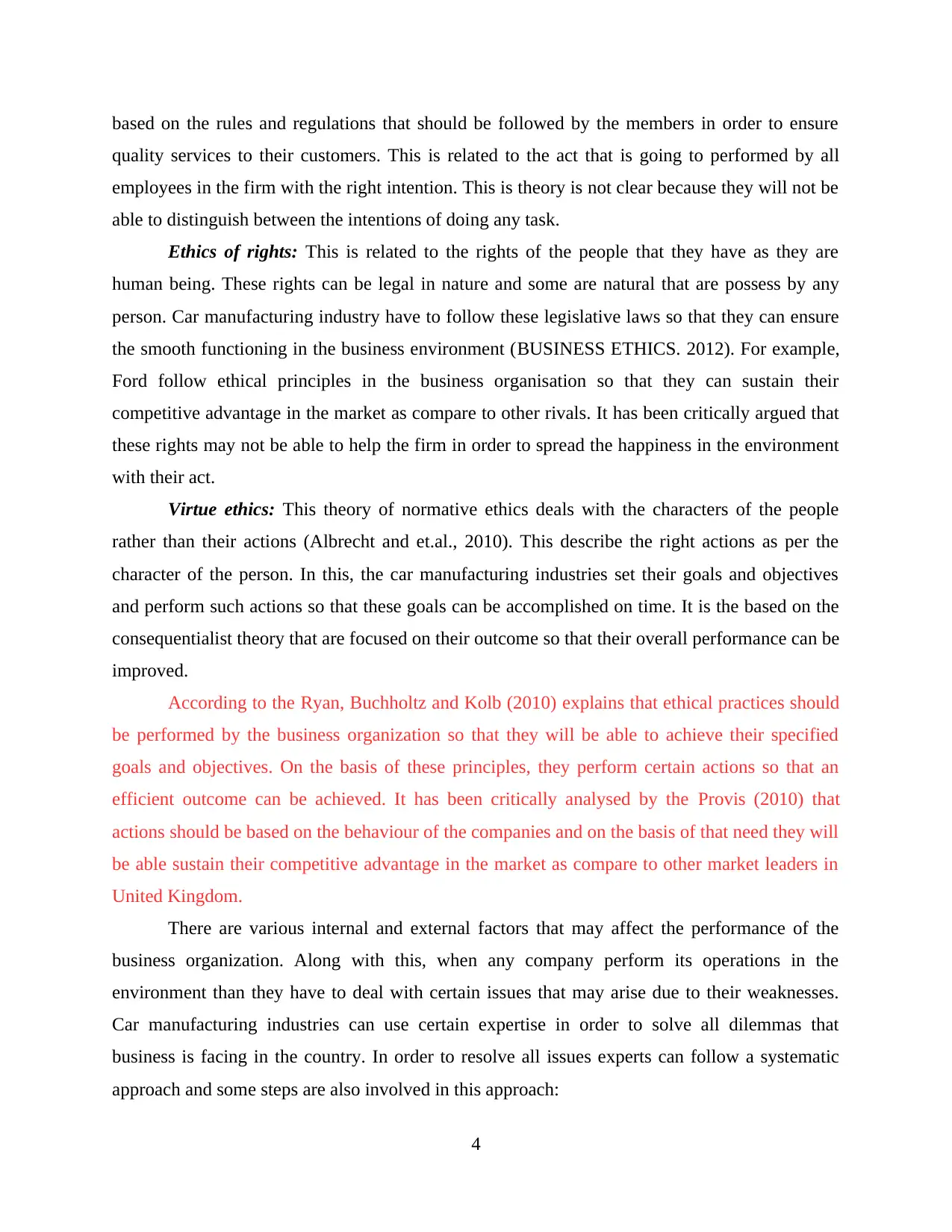
based on the rules and regulations that should be followed by the members in order to ensure
quality services to their customers. This is related to the act that is going to performed by all
employees in the firm with the right intention. This is theory is not clear because they will not be
able to distinguish between the intentions of doing any task.
Ethics of rights: This is related to the rights of the people that they have as they are
human being. These rights can be legal in nature and some are natural that are possess by any
person. Car manufacturing industry have to follow these legislative laws so that they can ensure
the smooth functioning in the business environment (BUSINESS ETHICS. 2012). For example,
Ford follow ethical principles in the business organisation so that they can sustain their
competitive advantage in the market as compare to other rivals. It has been critically argued that
these rights may not be able to help the firm in order to spread the happiness in the environment
with their act.
Virtue ethics: This theory of normative ethics deals with the characters of the people
rather than their actions (Albrecht and et.al., 2010). This describe the right actions as per the
character of the person. In this, the car manufacturing industries set their goals and objectives
and perform such actions so that these goals can be accomplished on time. It is the based on the
consequentialist theory that are focused on their outcome so that their overall performance can be
improved.
According to the Ryan, Buchholtz and Kolb (2010) explains that ethical practices should
be performed by the business organization so that they will be able to achieve their specified
goals and objectives. On the basis of these principles, they perform certain actions so that an
efficient outcome can be achieved. It has been critically analysed by the Provis (2010) that
actions should be based on the behaviour of the companies and on the basis of that need they will
be able sustain their competitive advantage in the market as compare to other market leaders in
United Kingdom.
There are various internal and external factors that may affect the performance of the
business organization. Along with this, when any company perform its operations in the
environment than they have to deal with certain issues that may arise due to their weaknesses.
Car manufacturing industries can use certain expertise in order to solve all dilemmas that
business is facing in the country. In order to resolve all issues experts can follow a systematic
approach and some steps are also involved in this approach:
4
quality services to their customers. This is related to the act that is going to performed by all
employees in the firm with the right intention. This is theory is not clear because they will not be
able to distinguish between the intentions of doing any task.
Ethics of rights: This is related to the rights of the people that they have as they are
human being. These rights can be legal in nature and some are natural that are possess by any
person. Car manufacturing industry have to follow these legislative laws so that they can ensure
the smooth functioning in the business environment (BUSINESS ETHICS. 2012). For example,
Ford follow ethical principles in the business organisation so that they can sustain their
competitive advantage in the market as compare to other rivals. It has been critically argued that
these rights may not be able to help the firm in order to spread the happiness in the environment
with their act.
Virtue ethics: This theory of normative ethics deals with the characters of the people
rather than their actions (Albrecht and et.al., 2010). This describe the right actions as per the
character of the person. In this, the car manufacturing industries set their goals and objectives
and perform such actions so that these goals can be accomplished on time. It is the based on the
consequentialist theory that are focused on their outcome so that their overall performance can be
improved.
According to the Ryan, Buchholtz and Kolb (2010) explains that ethical practices should
be performed by the business organization so that they will be able to achieve their specified
goals and objectives. On the basis of these principles, they perform certain actions so that an
efficient outcome can be achieved. It has been critically analysed by the Provis (2010) that
actions should be based on the behaviour of the companies and on the basis of that need they will
be able sustain their competitive advantage in the market as compare to other market leaders in
United Kingdom.
There are various internal and external factors that may affect the performance of the
business organization. Along with this, when any company perform its operations in the
environment than they have to deal with certain issues that may arise due to their weaknesses.
Car manufacturing industries can use certain expertise in order to solve all dilemmas that
business is facing in the country. In order to resolve all issues experts can follow a systematic
approach and some steps are also involved in this approach:
4
⊘ This is a preview!⊘
Do you want full access?
Subscribe today to unlock all pages.

Trusted by 1+ million students worldwide
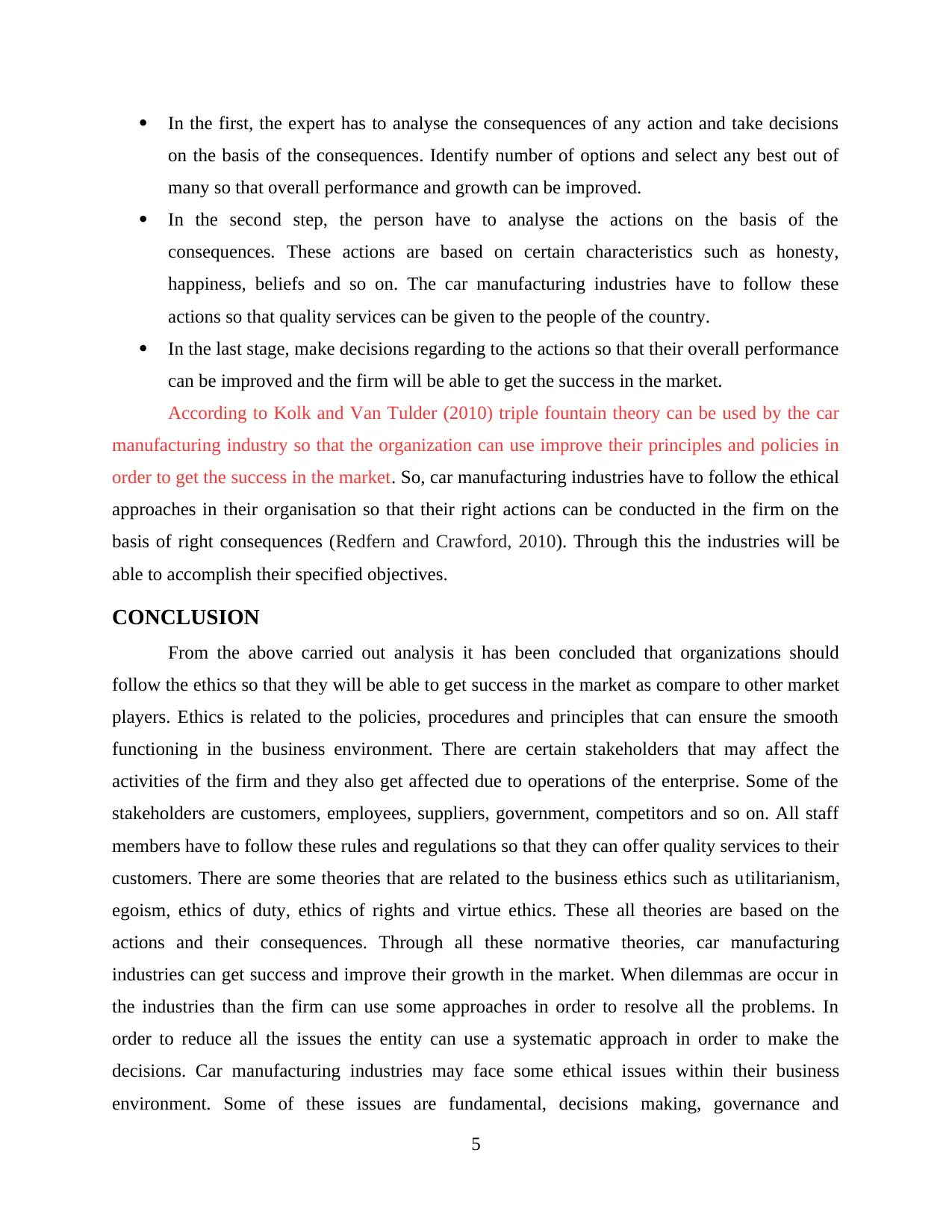
In the first, the expert has to analyse the consequences of any action and take decisions
on the basis of the consequences. Identify number of options and select any best out of
many so that overall performance and growth can be improved.
In the second step, the person have to analyse the actions on the basis of the
consequences. These actions are based on certain characteristics such as honesty,
happiness, beliefs and so on. The car manufacturing industries have to follow these
actions so that quality services can be given to the people of the country.
In the last stage, make decisions regarding to the actions so that their overall performance
can be improved and the firm will be able to get the success in the market.
According to Kolk and Van Tulder (2010) triple fountain theory can be used by the car
manufacturing industry so that the organization can use improve their principles and policies in
order to get the success in the market. So, car manufacturing industries have to follow the ethical
approaches in their organisation so that their right actions can be conducted in the firm on the
basis of right consequences (Redfern and Crawford, 2010). Through this the industries will be
able to accomplish their specified objectives.
CONCLUSION
From the above carried out analysis it has been concluded that organizations should
follow the ethics so that they will be able to get success in the market as compare to other market
players. Ethics is related to the policies, procedures and principles that can ensure the smooth
functioning in the business environment. There are certain stakeholders that may affect the
activities of the firm and they also get affected due to operations of the enterprise. Some of the
stakeholders are customers, employees, suppliers, government, competitors and so on. All staff
members have to follow these rules and regulations so that they can offer quality services to their
customers. There are some theories that are related to the business ethics such as utilitarianism,
egoism, ethics of duty, ethics of rights and virtue ethics. These all theories are based on the
actions and their consequences. Through all these normative theories, car manufacturing
industries can get success and improve their growth in the market. When dilemmas are occur in
the industries than the firm can use some approaches in order to resolve all the problems. In
order to reduce all the issues the entity can use a systematic approach in order to make the
decisions. Car manufacturing industries may face some ethical issues within their business
environment. Some of these issues are fundamental, decisions making, governance and
5
on the basis of the consequences. Identify number of options and select any best out of
many so that overall performance and growth can be improved.
In the second step, the person have to analyse the actions on the basis of the
consequences. These actions are based on certain characteristics such as honesty,
happiness, beliefs and so on. The car manufacturing industries have to follow these
actions so that quality services can be given to the people of the country.
In the last stage, make decisions regarding to the actions so that their overall performance
can be improved and the firm will be able to get the success in the market.
According to Kolk and Van Tulder (2010) triple fountain theory can be used by the car
manufacturing industry so that the organization can use improve their principles and policies in
order to get the success in the market. So, car manufacturing industries have to follow the ethical
approaches in their organisation so that their right actions can be conducted in the firm on the
basis of right consequences (Redfern and Crawford, 2010). Through this the industries will be
able to accomplish their specified objectives.
CONCLUSION
From the above carried out analysis it has been concluded that organizations should
follow the ethics so that they will be able to get success in the market as compare to other market
players. Ethics is related to the policies, procedures and principles that can ensure the smooth
functioning in the business environment. There are certain stakeholders that may affect the
activities of the firm and they also get affected due to operations of the enterprise. Some of the
stakeholders are customers, employees, suppliers, government, competitors and so on. All staff
members have to follow these rules and regulations so that they can offer quality services to their
customers. There are some theories that are related to the business ethics such as utilitarianism,
egoism, ethics of duty, ethics of rights and virtue ethics. These all theories are based on the
actions and their consequences. Through all these normative theories, car manufacturing
industries can get success and improve their growth in the market. When dilemmas are occur in
the industries than the firm can use some approaches in order to resolve all the problems. In
order to reduce all the issues the entity can use a systematic approach in order to make the
decisions. Car manufacturing industries may face some ethical issues within their business
environment. Some of these issues are fundamental, decisions making, governance and
5
Paraphrase This Document
Need a fresh take? Get an instant paraphrase of this document with our AI Paraphraser

compliance. Furthermore, the enterprise should resolve all these issues so that quality services
can be given to the customers in an efficient manner.
6
can be given to the customers in an efficient manner.
6
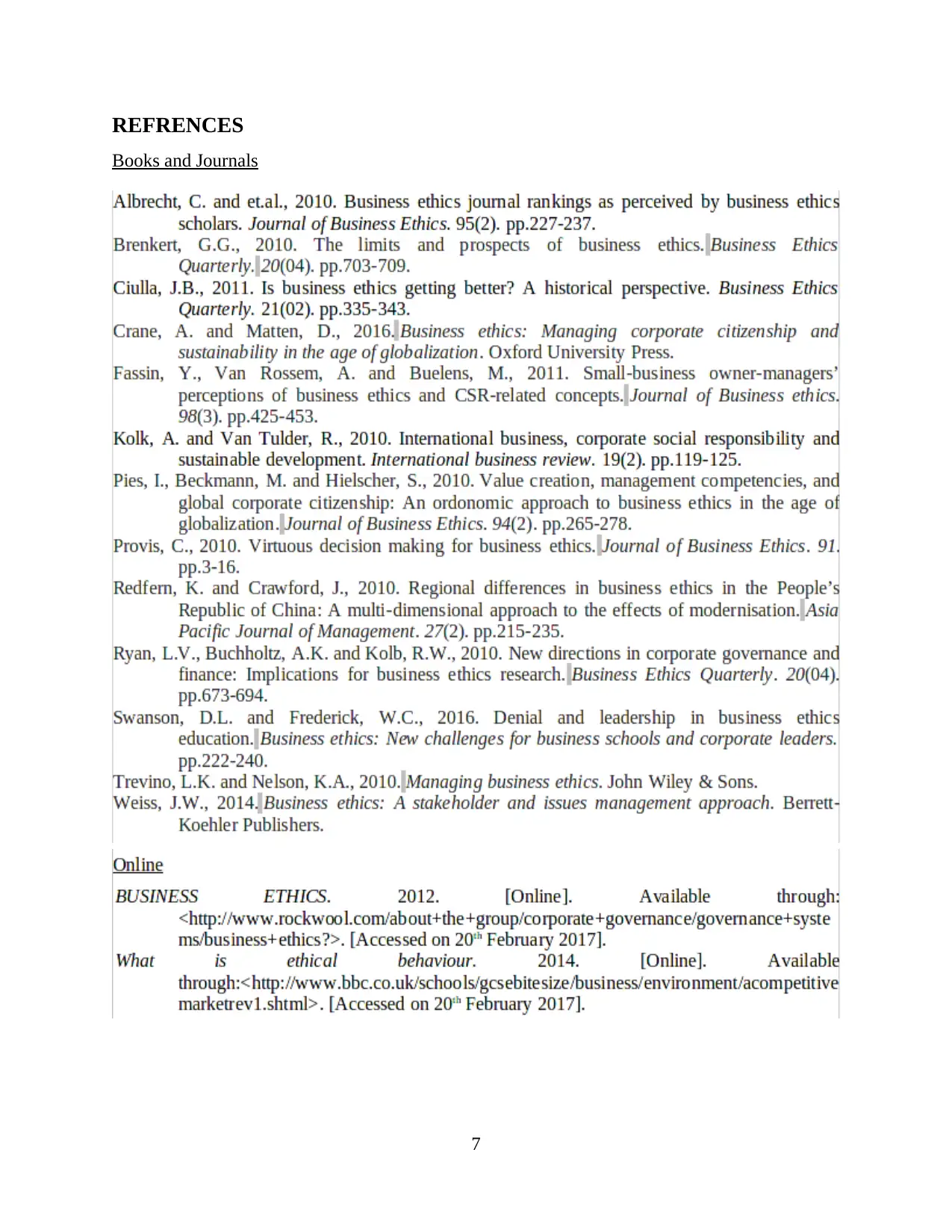
REFRENCES
Books and Journals
7
Books and Journals
7
⊘ This is a preview!⊘
Do you want full access?
Subscribe today to unlock all pages.

Trusted by 1+ million students worldwide

8
1 out of 10
Related Documents
Your All-in-One AI-Powered Toolkit for Academic Success.
+13062052269
info@desklib.com
Available 24*7 on WhatsApp / Email
![[object Object]](/_next/static/media/star-bottom.7253800d.svg)
Unlock your academic potential
Copyright © 2020–2026 A2Z Services. All Rights Reserved. Developed and managed by ZUCOL.





